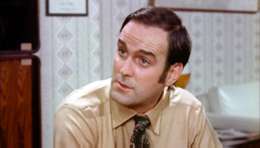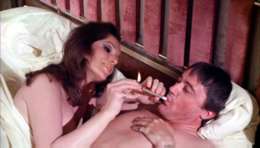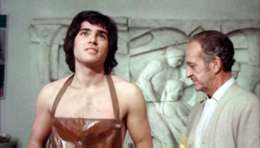

 The cinematic highway is littered with the roadkill resulting from "wacky" comedy ideas that resulted in sheer disaster and humiliation for everyone involved. Rhinestone. Sextette. Freddy Got Fingered. The Hottie and the Nottie. Crash. But all of these pale in comparison to the sheer wrongheaded lunacy of The Statue, a jaw-dropping affront to rational filmmaking with a cast who really should have known better dragged through one of the most illogical, laughable, and degrading premises ever conceived. If more than a dozen people actually saw this film, it might actually enjoy a cult reputation on par with Myra Breckinridge as an all-star train wreck that simply must be seen to be believed. As it is, this crafty stinkbomb has been snuck out quietly onto DVD to ambush a new generation of unprepared viewers who can only be left slackjawed in its pungent wake.
The cinematic highway is littered with the roadkill resulting from "wacky" comedy ideas that resulted in sheer disaster and humiliation for everyone involved. Rhinestone. Sextette. Freddy Got Fingered. The Hottie and the Nottie. Crash. But all of these pale in comparison to the sheer wrongheaded lunacy of The Statue, a jaw-dropping affront to rational filmmaking with a cast who really should have known better dragged through one of the most illogical, laughable, and degrading premises ever conceived. If more than a dozen people actually saw this film, it might actually enjoy a cult reputation on par with Myra Breckinridge as an all-star train wreck that simply must be seen to be believed. As it is, this crafty stinkbomb has been snuck out quietly onto DVD to ambush a new generation of unprepared viewers who can only be left slackjawed in its pungent wake.
 Alex Bolt (Niven), a respected linguist, has become an international celebrity after inventing a language called Unispeak that can easily be picked up by anyone in the world. (Apparently no one ever heard of Esperanto.) This breakthrough is such a success that he's chosen to receive the Nobel Prize, an honor to be commemorated with a huge statue of him commissioned for public display at the ceremony. His sculptress wife, Rhonda (Lisi), is chosen to create the work of art, but Alex is horrified when she unveils it to him privately only to reveal that its genitalia looks nothing like his. Apparently Alex is only home four days every six months, so she had to resort to other means of finding a genital model. Who is this mystery man? What was his wife doing in a room with a naked guy? Did anything racier happen in the process? Rather than having a simple conversation like two sane adults or assuming Rhonda just used artistic license, they have a screaming, bug-eyed spat about the whole thing, sending Alex off to use every means at his disposal to find out whose manhood wound up on his moment of glory. He confides his fears to his shrink (Cleese) and his pal Ray (Vaughn), the American ambassador who also wants to get into Rhonda's pants. And so the search begins which basically finds Alex snapping a picture of his privates in a public photo booth (with the expected nutty results), then running around London secretly checking out and photographing the equipment of men in every bathroom and steam room he can find. Then there's the loony Hair-style production with the naked leading man pursued by Alex during the love-in finale, a Scottish guy getting his jewels photographed through some stairs, and other hilarious hijinks that would get anyone else arrested for stalking and public indecency. Finally the truth is exposed in the cutesy final scene that actually raises even more problems with the initial premise of the film, but that's a discussion you'll have to undertake after the end credits.
Alex Bolt (Niven), a respected linguist, has become an international celebrity after inventing a language called Unispeak that can easily be picked up by anyone in the world. (Apparently no one ever heard of Esperanto.) This breakthrough is such a success that he's chosen to receive the Nobel Prize, an honor to be commemorated with a huge statue of him commissioned for public display at the ceremony. His sculptress wife, Rhonda (Lisi), is chosen to create the work of art, but Alex is horrified when she unveils it to him privately only to reveal that its genitalia looks nothing like his. Apparently Alex is only home four days every six months, so she had to resort to other means of finding a genital model. Who is this mystery man? What was his wife doing in a room with a naked guy? Did anything racier happen in the process? Rather than having a simple conversation like two sane adults or assuming Rhonda just used artistic license, they have a screaming, bug-eyed spat about the whole thing, sending Alex off to use every means at his disposal to find out whose manhood wound up on his moment of glory. He confides his fears to his shrink (Cleese) and his pal Ray (Vaughn), the American ambassador who also wants to get into Rhonda's pants. And so the search begins which basically finds Alex snapping a picture of his privates in a public photo booth (with the expected nutty results), then running around London secretly checking out and photographing the equipment of men in every bathroom and steam room he can find. Then there's the loony Hair-style production with the naked leading man pursued by Alex during the love-in finale, a Scottish guy getting his jewels photographed through some stairs, and other hilarious hijinks that would get anyone else arrested for stalking and public indecency. Finally the truth is exposed in the cutesy final scene that actually raises even more problems with the initial premise of the film, but that's a discussion you'll have to undertake after the end credits.
 While Niven has been able to retain his dignity in some pretty dire comedies like Old Dracula and The Impossible Years, this one really pushes him to the breaking point as his charming persona is torpedoed by scene after scene of him checking out naked guys in public. To counteract the obvious subtext of this premise, the film throws in a slew of bare female breasts that just make the whole thing even weirder, particularly when a scenery-chomping Vaughn rolls around in bed with a naked woman for no reason whatsoever apart from the actor's obvious enjoyment. Gratuitous T&A is always justifiable for good box office, of course, but here the tactic just seems like an audience-baiting distraction. Then there's Lisi, a beautiful, talented actress... when she's performing in Italian. Here she's just shrill and unintelligible most of the time, and the fact that she looks like Niven's granddaughter doesn't exactly help either. One of England's most valuable comic treasures, Cleese is completely wasted as the confused psychiatrist and given almost nothing humorous in his dialogue; the fact that he still comes off as the most sympathetic person in the script says quite a bit about his abilities. Oddly enough, this film was made in 1971, the same year Cleese began his most famous gig on television as part of Monty Python's Flying Circus; one of his colleagues from that show, Graham Chapman, even turns up here briefly as a news announcer. Behind the camera things don't fare much better with composer Riz Ortolani contributing what might be the most irritating, lazy score of his otherwise illustrious career. Director Rod Amateau came from a long TV background with only one feature film to his credit, the forgotten oddball sequel, Pussycat, Pussycat, I Love You. His future career produced
While Niven has been able to retain his dignity in some pretty dire comedies like Old Dracula and The Impossible Years, this one really pushes him to the breaking point as his charming persona is torpedoed by scene after scene of him checking out naked guys in public. To counteract the obvious subtext of this premise, the film throws in a slew of bare female breasts that just make the whole thing even weirder, particularly when a scenery-chomping Vaughn rolls around in bed with a naked woman for no reason whatsoever apart from the actor's obvious enjoyment. Gratuitous T&A is always justifiable for good box office, of course, but here the tactic just seems like an audience-baiting distraction. Then there's Lisi, a beautiful, talented actress... when she's performing in Italian. Here she's just shrill and unintelligible most of the time, and the fact that she looks like Niven's granddaughter doesn't exactly help either. One of England's most valuable comic treasures, Cleese is completely wasted as the confused psychiatrist and given almost nothing humorous in his dialogue; the fact that he still comes off as the most sympathetic person in the script says quite a bit about his abilities. Oddly enough, this film was made in 1971, the same year Cleese began his most famous gig on television as part of Monty Python's Flying Circus; one of his colleagues from that show, Graham Chapman, even turns up here briefly as a news announcer. Behind the camera things don't fare much better with composer Riz Ortolani contributing what might be the most irritating, lazy score of his otherwise illustrious career. Director Rod Amateau came from a long TV background with only one feature film to his credit, the forgotten oddball sequel, Pussycat, Pussycat, I Love You. His future career produced  an even more disastrous comedy, Son of Hitler with Peter Cushing and Bud Cort, which proved such a misfire it never even earned a release at all. Perhaps appropriately, his directorial efforts finished off with perhaps the single weirdest film of the 1980s, The Garbage Pail Kids Movie. Writer Denis Norden has a long history as one of England's top comedy TV writers along with solid feature credits like Buona Sera, Mrs. Campbell, but the script here (taken from his play entitled Chip, Chip, Chip, which presumably worked better onstage) does a good job of camouflaging his talent.
an even more disastrous comedy, Son of Hitler with Peter Cushing and Bud Cort, which proved such a misfire it never even earned a release at all. Perhaps appropriately, his directorial efforts finished off with perhaps the single weirdest film of the 1980s, The Garbage Pail Kids Movie. Writer Denis Norden has a long history as one of England's top comedy TV writers along with solid feature credits like Buona Sera, Mrs. Campbell, but the script here (taken from his play entitled Chip, Chip, Chip, which presumably worked better onstage) does a good job of camouflaging his talent.
Released at the height of Cinerama's distribution period in the early '70s, The Statue somehow got lost in the shuffle among dismissive reviews and muffled audience response. A VHS version from Prism didn't really do much to raise its profile either, as the cartoony cover gave little indication of the outrageously rank contents of the film itself. One can only wonder what fate will befall it on DVD, with Code Red apologetically resorting to a theatrical print for their transfer due to insufficient elements available from the current licensor. The actual picture quality is fine, with strong colors and reasonable detail. However, the print displays frequent speckles and debris, which will either be nostalgic or incredibly distracting depending on your home theater temperament. It's still much better than the tape presentation, and a few of the more stylish sequences (especially the Hair bit) look pretty terrific all things considered. The only extra is the oh-so-zany theatrical trailer, along with bonus trailers for Family Honor, A Long Ride from Hell, Changes, Rivals, Stigma, Derby, Choke Canyon, The Visitor, and They're the Ghetto Warriors. For fans of misguided '70s celeb-studded trash, it doesn't get much better than this.